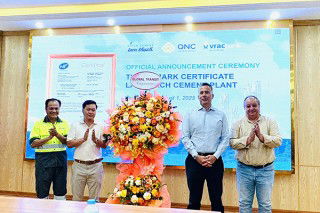Siam Cement Group (SCG), Thailand's largest industrial conglomerate by revenue, is stepping up its plans to build on its cement and building materials activities in Southeast Asia as it eyes new regional investments and acquisitions in the markets of Indonesia, Vietnam and Myanmar.
Earlier this week, the company announced plans to construct a 5000tpd cement plant in Indonesia as the manufacturer looks to penetrate the market further. With an investment of US$300m, the cement works will be situated in Sakubami, West Java, and construction is expected to start by the end of this year. The move comes just one month after SCG purchased 100% of Boral Indonesia for US$135m, which involves concrete, quarry and precast operations. The deal has been viewed positively by analysts at CIMB Securities who highlight that it gives SCG access to local limestone reserves, further strengthens its businesses in Indonesia and fits in with SCG's strategy to market cement and building materials in the region. Kan Trakulhoon, president and CEO of SCG, has recently said that the company’s growth lies outside of Thailand, and Indonesia is a big part of that. Speaking to the Jakarta Globe, he said: "During the last four to five years, the growth was very good. [SCG] has a lot of confidence in Indonesia."
Looking ahead, Mr Kan said that in the next five years, the company – whose core business units include cement, building materials, chemicals and paper – would invest US$5bn in the ASEAN region through various investments. This year, it is looking to invest US$1.3-1.5bn and plans to sell up to THB25bn of four-year bonds in March to refinance debt and help fund its expansion. In terms of its building materials segment, in February it reached a deal to raise its stake in a listed Philippine building materials firm from 40 to 80% for THB1bn. It is also said to be closing in on a stake in a Vietnam cement maker which is expected to be concluded by the second half of this year.
SCG is also evaluating investment opportunities in Myanmar, to which it currently exports cement. The company has reportedly been studying options for a cement plant for the past two years as political and economic changes open up new potential in the country. However, Mr Kan has been quoted as saying that the decision still depends on the Myanmar government's investment promotion policies and the policy on limestone mine ownership." Last year, SCG reported a 20% decline in export sales to Myanmar as the transition to a democratic government in 2011 affected a number of construction projects and reduced cement sales. For this year, it anticipates a rise in sales despite increased competition. Syamrath Suthanukul, marketing director of SCG, said: “We know that there will be more cement brands in Myanmar in coming years and we expect to face strong competition but it’s still a great market to be in.”
In terms of its recent financial performance, last year, the company reported an overall decline in net profit of 27%, mainly due to an absence of hefty non-recurring divestment gains and the impact of severe flooding during the fourth quarter. Many SCG plants were temporarily shut down in October and November due to the heavy rains, while production at other plants was disrupted by supply chain problems, resulting in an 81% drop in 4Q net profit. Lower profitability is one reason why Fitch Ratings recently revised its rating on SCG’s local-currency debt to stable from positive, and said that an upgrade was unlikely. Fitch expects SCG’s EBITDA margin to drop further in 2012 “due to likely weakening of chemical product margins. The healthier profitability of cement, paper and building material businesses should help it maintain EBITDA margin in high single digits in 2012. SCG’s EBITDA margin should gradually improve alongside an upturn of the chemicals industry in 2013,” the ratings agency said.
While a weak global economy may put pressure on its chemical unit, sales are expected to recover in 2012 on the back of pent-up demand for cement and other materials for post-flood reconstruction. Mr Kan has forecast a 12% rise in overall sales and stated that growth could be higher through acquisitions. This year, sales of construction materials are forecast to grow by 10% and cement by 5%. In 2011, the company sold 23.2Mt of cement including 6.5Mt for export. SCG sees consumption in the commercial segment rebounding substantially although demand from the residential market is expected to recover slowly over the next 6-12 months.
